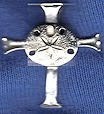WASHINGTON: Presiding bishop visits Welcome Table ministry
By Teresa Hobgood, April 26, 2010
Church of the Epiphany] "Each and every one of you is a shepherd," Presiding Bishop Katharine Jefforts Schori told nearly 150 parishioners, the Welcome Table choir, and homeless men and women gathered to participate the Welcome Table service April 25 at the Church of the Epiphany in Washington, D.C.
Epiphany was one of the presiding bishop's stops during her April 23-25 visit to the Diocese of Washington. She also visited St. John's Episcopal Church in Lafayette Square and St. George's Episcopal Church in St. Mary's County, Maryland.
Though skies were overcast and rain fell gently, the pews inside Epiphany were filled with warmth and light. Focusing much of her sermon on sheep and shepherds, Jefferts Schori said, "Shepherds in the ancient world and even today do hard, dirty work. For Jesus to call himself a good shepherd is sort of an insult. Shepherds weren't people that good Jews came out with in the first century. They did dirty work, and they didn't observe the law. They weren't welcome in the temple."
Noting that people still herd sheep today, the presiding bishop said she comes from Nevada where, at one time, lots of the shepherds were Basque.
"One hundred years ago, they came here from Europe to watch sheep, and they lived out there in the dirt in the desert for months and months on end," she said. "Today, those shepherds come from Peru and places south of us. They are still out there doing that kind of hard work -- making sure the sheep are not eaten by coyotes; that the mother sheep get help with their lambs; that they find pasture and clean water."
Jefferts Schori shared a story in Spanish about a Peruvian shepherd who spent a lot of time on the trail; who had "lot of guts, but no cash." Jesus, the Good Shepherd, she said, "is out there on the trail, doing the dirty work, inviting people to the table, to the feast, calling each one of us by name."
"We need more good shepherds who are willing to go out there and invite everybody to the feast. We need more good shepherds in Congress. We need more good shepherds in schools. We need more good shepherds in the choir. We need more good shepherds on the streets. Each and every one of us is both a sheep and a shepherd," she said.
Toward the end of her homily, Jefferts Schori spoke of the scripture passage in which a voice from heaven describes Jesus as "beloved."
"When Jesus calls us, we are supposed to be able to hear him calling," she said. "Do you hear him when he calls you beloved? Each and every one of us, Beloved? Well, that is what Jesus heard when he was baptized... 'in you I am well pleased.' Beloved, Beloved. Come follow. Gather up your brothers and sisters. Come to the table. Come to the table…Welcome."
Before Epiphany's 8:00 a.m. service, Jefferts Schori spent time with the parish's Bible study class and she engaged a lively group of homeless men and women and other participants in Epiphany's Gospel Art! program, where she accepted drawings from the participants. She also spent time in the kitchen, serving butter-laden grits to nearly 100 homeless men and women and parishioners. She also talked with a group of homeless men in the parish hall, answering their questions about her family and how she became a bishop.
Young people from the Chapel of the Cross, an Episcopal parish in Chapel Hill, North Carolina were also visiting Epiphany during the 8:00 am service and lent their hands with breakfast, Gospel Art! and the Welcome Table choir. More information about the Welcome Table ministry is available here.
-- Teresa Hobgood is a member of the Church of the Epiphany and serves on the Welcome Table Ministry Team.




